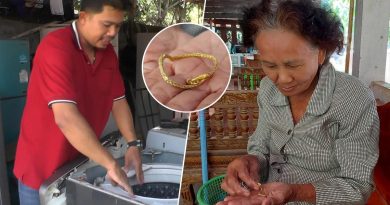Direct rice price intervention urged
USING 24 billion baht on a rice pledging scheme for farmers who have their own barns at minimum 10,000 baht a tonne will only help alleviate the low paddy price problem up to a point with a direct price intervention, either through a rice pledging scheme or guaranteeing the price of this commodity, being more beneficial, Dr Anusorn Tamajai, Rangsit University’s vice president for research and academic service said yesterday.
The government should implement measures to encourage farmers to set up companies or agricultural cooperatives to increase their bargaining power in both the market and production structures because right now while the paddy price is low, the price of rice for consumption and exports has not come down substantially and this difference in pricing is not reaching the majority of the people.
 Strong competition is absent from the current market structure because big businesses have monopolistic power. However the government should not itself become monopolistic because it will create similar, or perhaps worse, problems, Dr Anusorn pointed out.
Strong competition is absent from the current market structure because big businesses have monopolistic power. However the government should not itself become monopolistic because it will create similar, or perhaps worse, problems, Dr Anusorn pointed out.
For this reason he urges to government to study and find measures to adjust and improve this structure because this will be truly resolving the problem without using a lot of national budget and increasing financial burden.
The policy to intervene or support the price, be it through pledging schemes or price guarantees when prices are low, should only be used for a certain period to alleviate the suffering of the farmers.
This is because price intervention has a negative impact on the economy, the market structure and the government’s fiscal position while also not improving the farmers’ livelihood, the well-known economist said
The government should also change the way rice is pledged and not let it turn into a government rice trade monopoly or setting the pledging price much higher than the market price because this could be a signal of price distortion which would lead to expansion of paddy farming that in turn would crowd out the growth of other crops.
Dr Anusorn added that low rice and other agricultural product price will reduce the buying power in the countryside with this affecting various agricultural activities in the Central, Northeast and some provinces in the North.
However as exports have edged up and tourism is also expanding continuously this will lead to Thai GDP not being lower than 3% this year with the third quarter GDP growth being the year’s best and the economy slowing down a little bit in the fourth quarter compared to the previous quarter.
CAPTIONS:
Top: A farmer working on his paddy fields during harvest season. Photo: Prachanart Viriyaraks (CC-BY-2.0)
Inset: Dr Anusorn says farmers should be encouraged to set up companies and cooperatives.
By Thai Residents reporters



